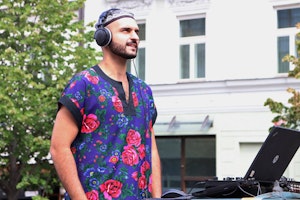For LGBTQ Youth in Athens, a Chance to Stand and Be Heard
By George-K. Charonis
There is some irony in the notion of a young people’s organization reminding the Greek government of the responsibility it has to citizens of Athens, the classical birthplace of democracy.
Colour Youth represents the LGBTQ (lesbian, gay, bisexual, transgender, and queer) youth community in Athens. As a member of this human rights organization—and a citizen—I would argue that democracy is not served when majority opinions are followed and a minority is marginalized as a result. Russia is a prime example of this distortion in its attempt to outlaw homosexuality. Modern democracy is predicated on inclusivity, or it should be, but too often in Greece, our community is on the outside looking in.
In Greece, hate speech and violence based on sexual orientation and gender identity have increased, along with racist violence. These trends are difficult to quantify nationally, because in few instances is the nature of an attack officially recognized when the cause is sexual orientation or gender identity. Local advocacy groups are keeping count, however, and we see the results.
The fact that the authorities don’t maintain statistics on violent attacks is illustrative of the official stance on LGBT rights. Silence. Politicians refrain from addressing, or even talking about relevant subjects for fear of upsetting conservatives and the Greek Orthodox Church.
When the treatment of the LGBT community is measured—in an EU Fundamental Rights Agency survey, for example—Greece performs poorly compared to its fellow EU member states, and polls show public acceptance is low. ILGA-Europe, the European region of the International Lesbian, Gay, Bisexual, Trans and Intersex Association produces an annual “Rainbow Map,” awarding a score to each country. Full equality in human rights and civil liberties for the LGBT community would earn a score of 100 percent. The highest mark for 2013 was the U.K. at 77 percent. Greece scored 28 percent, lower than most, but not all, of the EU countries and similar to Montenegro, Slovakia, and Estonia.
One reason is Greece’s failure to allow same-sex couples to enter civil unions. Of 19 European countries that allow legal partnerships other than marriage, only Greece and Lithuania ban same-sex couples, denying them the raft of legal benefits that other couples are able to enjoy.
Colour Youth’s constituency is 18- to 30-year-olds, so naturally we are focused on nondiscrimination in education. Equal access to education is a fundamental human right, and the kind of homophobic and transphobic bullying we are witnessing severely impacts young peoples’ ability to exercise that right. Bullying means kids don’t show up to school, their performance suffers, they drop out, and there can be serious mental health issues.
The problem is exacerbated because much of the abuse comes from educators and school authorities. One survey found one in three young people had experienced discrimination from a teacher or staff member at school or university. In one case highlighted by Amnesty International, a transgender woman attending night school in Athens was subjected to years of harassment and intimidation from school management, which facilitated student violence including an attempt to set the woman on fire. One teacher supported the student and was suspended. The Justice Minister said he was unable to intervene because the student had taken legal action.
While Greek politicians have stood idly by, the community has received some support from European legislators. In November 2013, the European Court of Human Rights fined Greece for excluding same-sex couples from the civil unions law. This drew a reaction from the government which suggested amending the law as part of an anti-racism bill, but opposition from the right and the church meant the idea was shelved.
The ECtHR action had the effect of putting the issue on the political agenda and showed that Greece is susceptible to outside pressure. Greece has committed to agreements to which it is a signatory, like the Declaration of Human Rights and the Convention on the Rights of the Child, and we can usefully remind Greece of its international obligations. The ECtHR ruling also demonstrated to us that we needed to raise our profile at the Europe-wide level during the May elections that are taking place alongside municipal elections in Greece.
As a result, in partnership with the Athens Pride organization, which is celebrating its 10th anniversary this year, Colour Youth is organizing a campaign called Vote For Your Rights. We are calling on the LGBTQ community to stand up and vote for candidates who prioritize our rights and don’t stay silent where they see injustice. Our hope is to raise the political profile of the community. As part of the campaign we are asking politicians to sign a pledge supporting LGBTI and other minority rights drawn up by ILGA-Europe.
In further efforts to raise awareness, Colour Youth hosted a panel discussion for candidates and MEPs and is researching the voting tendencies of the LGBTQ population.
All this work is designed to promote LGBTQ rights as basic human rights. This is still necessary even though we have made progress as a country in the last 20 years. We need legislation at the European level because Greek practice still lags behind the law in key areas like workplace discrimination.
In the short term, the aim has to be to increase visibility for the LGBTQ community on the national stage and end the silence that allows for violence to remain unreported, against us but also immigrant groups in Greek society that bear the brunt of the far-right Golden Dawn’s attention, and for politicians to deny that such violence takes place at all.
While there are no openly gay or lesbian MPs or MEPs there are LGBTQ candidates standing in the upcoming elections for smaller parties, including two transgender candidates. Again, and by such measurable progress, the visibility of the LGBTQ community at large is raised and foundations are laid for the future. In the meantime, we will continue to persuade Greek government and society that education and a safe living and working environment are basic human rights that many in their midst are simply not able to enjoy.
Colour Youth is a grantee of the Open Society Foundations.
George-K. Charonis is the manager of Colour Youth.


